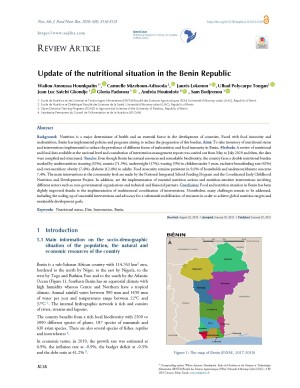Update of the nutritional situation in Benin Republic
Abstract
Background: Nutrition is a major determinant of health and an essential factor in the development of countries. Faced with food insecurity and malnutrition, Benin has implemented policies and programs aiming to reduce the progression of this burden. Aims: To take inventory of nutritional status and interventions implemented to reduce the prevalence of different forms of malnutrition and food insecurity in Benin. Methods: A review of nutritional and food data available at national level and consultation of intervention management reports was carried out from May to July 2020 and then, the data were compiled and structured. Results: Even though Benin has natural resources and remarkable biodiversity, the country faces a double nutritional burden marked by undernutrition: stunting (32%), anemia (71.5%), underweight (17%), wasting (5%) in children under 5 years, exclusive breastfeeding rate (42%) and over-nutrition: obesity (7.4%), diabetes (12.4%) in adults. Food insecurity remains persistent in 9.6% of households and undernourishment concerns 7.4%. The main interventions at community level are made by the National Integrated School Feeding Program and the Coordinated Early Childhood Nutrition and Development Project. In addition, are the implementation of essential nutrition actions and nutrition-sensitive interventions involving different sectors such as, non-governmental organizations and technical and financial partners. Conclusion: Food and nutrition situation in Benin has been slightly improved thanks to the implementation of multisectoral coordination of interventions. Nonetheless, many challenges remain to be addressed, including the scaling up of successful interventions and advocacy for a substantial mobilization of resources in order to achieve global nutrition targets and sustainable development goals.
Full text article
Authors
Copyright (c) 2020 Authors

This work is licensed under a Creative Commons Attribution 4.0 International License.
-
Attribution — You must give appropriate credit, provide a link to the license, and indicate if changes were made. You may do so in any reasonable manner, but not in any way that suggests the licensor endorses you or your use.
-
No additional restrictions — You may not apply legal terms or technological measures that legally restrict others from doing anything the license permits.





